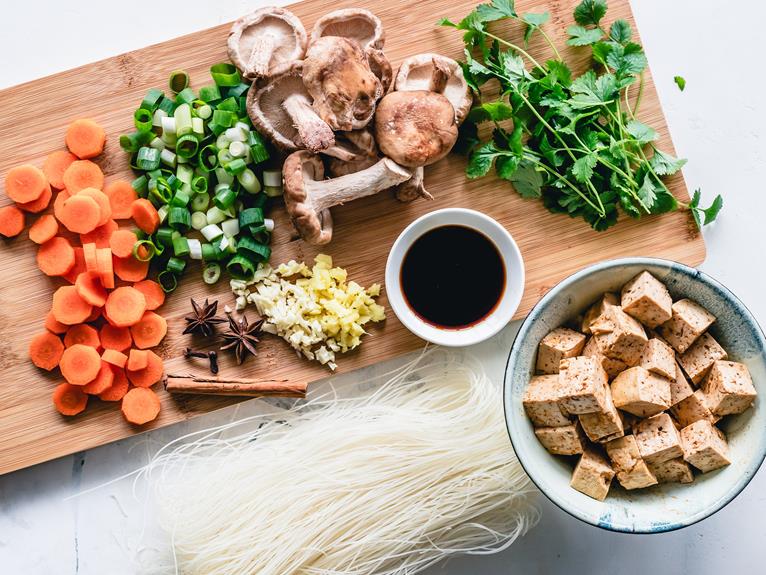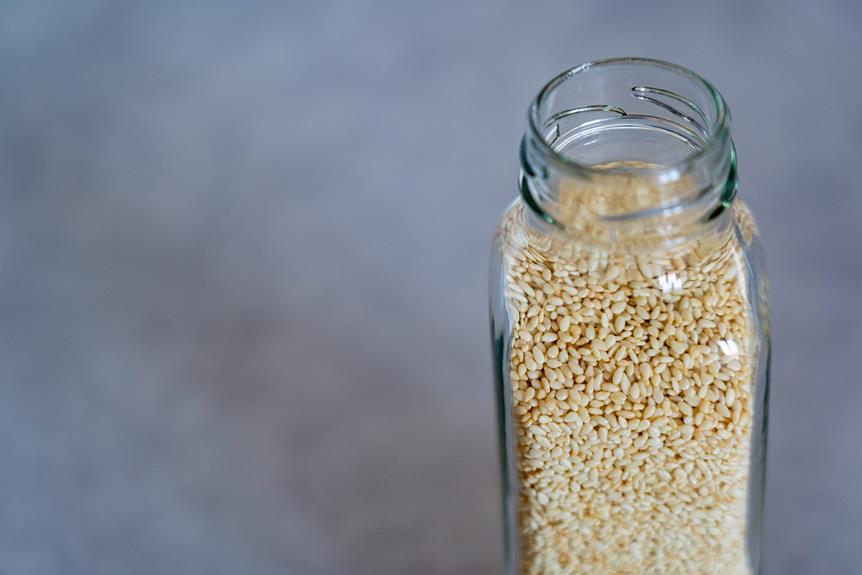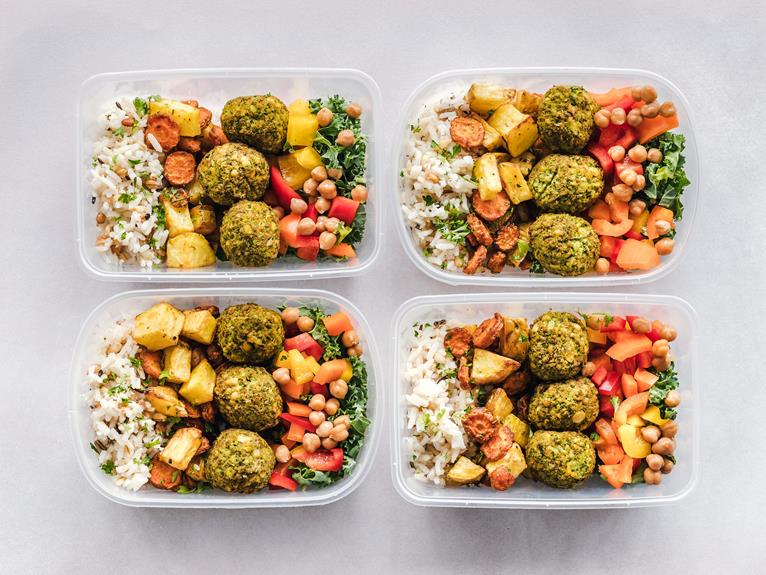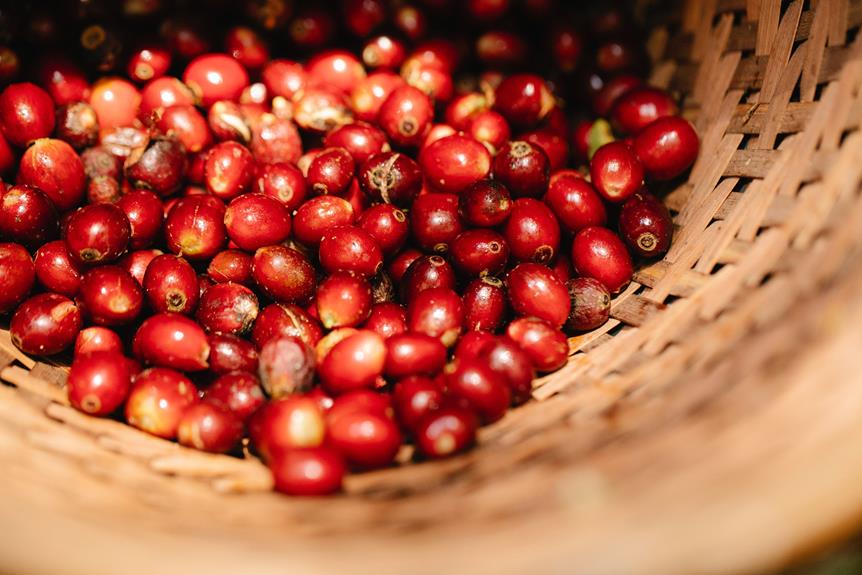Looking to add some excitement to your meals? Look no further! We've put together a list of 15 herbs and spices that will not only give your dishes a burst of flavor but also provide some health benefits.
From fragrant basil to comforting cinnamon, each herb and spice on this list is full of deliciousness.
So get ready to take your cooking to the next level and discover new possibilities in your kitchen.
Basil
Basil is a versatile herb that adds a burst of fresh flavor to your meals. It not only enhances the taste of your dishes but also offers numerous health benefits. Using fresh basil in cooking can improve digestion, boost the immune system, and reduce inflammation. This aromatic herb is packed with antioxidants, vitamins A and K, and minerals like potassium and magnesium.
There are endless creative ways to incorporate basil into your meals. One idea is to make a flavorful pesto sauce by blending basil leaves, garlic, pine nuts, Parmesan cheese, and olive oil. This sauce can be used as a dip, spread on sandwiches, or tossed with pasta. Another option is to add fresh basil leaves to salads, soups, or stir-fries for an extra burst of freshness.
For a twist on traditional dishes, try using basil in unconventional ways. Add it to your fruit salad to bring out the natural sweetness or infuse it in water for a refreshing and aromatic beverage. You can even use basil leaves as a garnish on top of pizzas or grilled meats to add elegance and freshness to your dishes.
Incorporating fresh basil into your cooking not only elevates the flavor of your meals but also brings a sense of creativity and excitement to your kitchen. So go ahead and experiment with this versatile herb and enjoy the benefits it brings to your culinary adventures.
Cinnamon
Cinnamon is a delicious and healthy addition to your meals. It enhances both the flavor and health benefits of your dishes. Not only does it bring a delightful sweetness to your taste buds, but it also offers numerous health benefits that make it worth incorporating into your diet more often.
There are different varieties of cinnamon, each with its own unique flavor:
- Ceylon Cinnamon: This variety has a delicate and slightly citrusy flavor.
- Cassia Cinnamon: It has a strong and spicy flavor.
- Saigon Cinnamon: This variety is intensely sweet and spicy.
Now that you know the different flavors, let's explore the health benefits of cinnamon and some creative ways to use it in your cooking.
Cinnamon is rich in antioxidants and has anti-inflammatory properties, which can boost your immune system and reduce the risk of chronic diseases. It also helps in controlling blood sugar levels, making it especially beneficial for those with diabetes or anyone looking to manage their blood sugar.
To incorporate cinnamon into your meals, you can sprinkle it on your morning oatmeal or add it to your coffee for a flavorful twist. It can also be used in baking, added to smoothies, or even sprinkled on roasted vegetables to add a unique and delicious taste.
With its versatile flavor and numerous health benefits, cinnamon is a must-have spice in your kitchen.
Turmeric
Turmeric is a versatile spice known for its health benefits and unique flavor. Adding this golden spice to your daily diet can't only enhance the taste of your meals but also provide various health benefits. One important benefit of turmeric is its ability to prevent chronic diseases. Curcumin, the active compound in turmeric, has anti-inflammatory and antioxidant properties that can help lower the risk of conditions like heart disease, cancer, and diabetes.
There are many ways to incorporate turmeric into your diet. You can sprinkle a little turmeric into your morning smoothie or oatmeal to start your day. It can also be used as a spice in cooking, whether you're making curries, stir-fries, or roasted vegetables. Another popular option is to enjoy a warm and comforting turmeric latte, also known as golden milk. Simply heat up milk (dairy or plant-based) with a teaspoon of turmeric, a pinch of black pepper, and a touch of honey or maple syrup for sweetness.
Rosemary
Rosemary is a fragrant herb that adds a delightful flavor and aroma to your dishes. Including rosemary in your daily diet can provide you with several benefits.
Rosemary contains antioxidants that help protect your body from free radicals, reducing the risk of chronic diseases. Additionally, it has anti-inflammatory properties that can help alleviate symptoms of arthritis and other inflammatory conditions. Rosemary also supports digestion by stimulating the production of bile, aiding in the breakdown of fats.
It's also known to improve concentration and memory, making it a great herb to include in your diet if you're studying or working on a project.
You can easily incorporate rosemary into your favorite recipes to enhance their taste and nutritional value. Add fresh rosemary leaves to roasted vegetables for a savory and aromatic twist. Infusing olive oil with rosemary creates a flavorful base for dressings or marinades. Use rosemary to season grilled meats or fish, adding a fragrant and savory element to your dishes. Sprinkle dried rosemary over homemade bread or pizza dough for a delicious herbal flavor.
With its versatility and health benefits, rosemary is a must-have herb in your kitchen that will elevate your meals to a whole new level.
Ginger
Ginger is a versatile spice that adds a unique and zesty flavor to your meals. It not only enhances the taste of your dishes but also brings numerous health benefits. For centuries, ginger has been used in traditional medicine to aid digestion and reduce inflammation. It's packed with antioxidants, which can strengthen your immune system and protect against chronic diseases.
When it comes to cooking with ginger, there are countless creative ways to incorporate it into your meals. One popular method is grating fresh ginger and adding it to stir-fries or sautés, giving your dishes a burst of flavor. You can also infuse ginger into drinks like tea or smoothies for a refreshing and invigorating twist. Another option is using ground ginger in baking, adding warmth and depth to cakes, cookies, or even homemade granola.
To enjoy the health benefits of ginger, you can try making ginger-infused water by steeping sliced ginger in hot water. This soothing beverage can be a great addition to your daily routine. Ginger can also be used in marinades or dressings to add a tangy kick to your salads or grilled meats.
Incorporating ginger into your meals not only adds flavor but also provides numerous health benefits. Give it a try and see how this versatile spice can elevate your culinary experience.
Oregano
Oregano is a versatile herb that adds a delightful and aromatic flavor to your meals. It's a popular ingredient in Mediterranean cuisine, known for its health benefits and culinary uses.
Let me tell you why you should incorporate oregano into your cooking:
- Health benefits: Oregano is packed with antioxidants and has antibacterial properties. It may also have anti-inflammatory effects and boost your immune system. Including oregano in your meals can contribute to your overall well-being.
- Culinary uses: Oregano is a versatile herb that can be used in various dishes. It pairs well with tomatoes and is a key ingredient in Italian pasta sauces and pizza. You can also sprinkle it on roasted vegetables, grilled meats, or add it to marinades and dressings for an extra burst of flavor.
- Culinary tradition: By using oregano in your meals, you connect to a long-standing culinary tradition. It's a staple in many Mediterranean cuisines, and incorporating it into your cooking gives you a sense of belonging to a larger culinary community.
Incorporating oregano into your meals not only enhances the taste but also provides potential health benefits. So go ahead and experiment with this versatile herb to add a touch of Mediterranean magic to your dishes.
Thyme
Thyme is a versatile herb that adds a distinct and savory flavor to your cooking. Its aromatic qualities and earthy taste make it a popular choice in Mediterranean and Middle Eastern cuisines. But using thyme in your meals goes beyond just flavor – it also has health benefits.
Thyme is packed with antioxidants, which help protect your body from harmful free radicals. It also contains compounds that can reduce inflammation in the body. In addition, thyme enhances digestion and supports your immune system. So when you use thyme in your cooking, you're not only adding depth of flavor, but also promoting your well-being.
To elevate your dishes even more, try unique flavor combinations with thyme. Pair it with lemon for a vibrant twist, or mix it with garlic for a savory kick. For a touch of sweetness, experiment with thyme and honey. And if you're feeling adventurous, blend thyme with rosemary for an herbal infusion that will take your meals to the next level. With thyme, the possibilities are endless, and your taste buds will thank you.
Paprika
Let's take a closer look at paprika, a versatile herb that adds a burst of flavor to your dishes. Here are three key points to know about paprika:
- Different varieties of paprika: Smoked vs Sweet: Paprika comes in two main types: smoked and sweet. Smoked paprika offers a rich, smoky taste that enhances stews and roasted vegetables, bringing warmth to your meals. On the other hand, sweet paprika has a milder flavor, making it a great choice for soups, sauces, and even deviled eggs.
- Boosting immunity with paprika: Paprika is a great source of vitamin C, which plays a crucial role in supporting a healthy immune system. By incorporating paprika into your meals, you can strengthen your body's defenses and protect against illnesses.
- Promoting digestion with paprika: Paprika is also known to aid digestion. It stimulates the production of gastric juices, which helps break down food more efficiently. Adding a sprinkle of paprika to your meals may alleviate digestive discomfort and contribute to a healthier gut.
With its delicious flavors and health benefits, paprika is a valuable addition to any spice collection. Try out different varieties and savor the warmth and flavor it brings to your dishes.
Garlic
Garlic is a versatile herb that adds depth and flavor to many dishes. It not only enhances the taste of your meals but also provides numerous health benefits. One key benefit is its ability to boost the immune system. Garlic contains compounds that stimulate the production of white blood cells, which are essential for fighting infections and diseases. You can easily incorporate garlic into your everyday recipes, such as sautéing vegetables, roasting meats, or making homemade pasta sauce. Adding minced garlic will elevate the flavor of your dish.
If you love garlic, consider growing it at home. Garlic is easy to grow with minimal maintenance. Simply plant the cloves in well-drained soil, provide enough sunlight, and water regularly. In a few months, you'll have your own harvest of fresh garlic.
Apart from its culinary uses, garlic offers various health benefits. It has been shown to lower blood pressure, reduce cholesterol levels, and improve cardiovascular health. Additionally, garlic has antimicrobial properties that help fight bacteria and viruses.
Cumin
Cumin is a versatile spice that adds a unique and aromatic flavor to a wide range of dishes. Let's explore cumin's health benefits and get creative with it in your cooking!
- Improve digestion: Cumin has been used for centuries to aid digestion. Its natural compounds can stimulate the production of digestive enzymes, helping your body absorb nutrients better and ease digestive discomfort. Add a pinch of ground cumin to your lentil soup or roasted vegetables for a flavorful and digestive-friendly meal.
- Boost your immune system: Cumin is packed with antioxidants that can strengthen your immune system and protect your cells from damage. Incorporate cumin into your marinades and rubs for grilled chicken or roasted meats to give your immune system an extra boost.
- Enhance the flavor of grains: Cumin adds a depth of flavor to rice, quinoa, and other grains. Toast whole cumin seeds in a dry pan until fragrant, then add them to your cooking water for a subtle, nutty taste. You can also sprinkle ground cumin over couscous or mix it into your homemade bread dough for a delightful twist.
With its health benefits and versatility, cumin is a must-have spice in your kitchen. So go ahead, explore its flavors, and get creative with it in your cooking!
Parsley
Let's now shift our focus to parsley, a versatile herb that can elevate the flavors of your dishes. Whether you're an experienced cook or just starting out, parsley is a must-have ingredient that brings freshness and vibrancy to your meals.
Parsley is rich in vitamins A and C, which support a healthy immune system and promote glowing skin. It's also high in antioxidants, which can help reduce inflammation in the body. In addition, parsley supports heart health and aids digestion.
To incorporate parsley into your meals, you can mix chopped parsley into your salads for added freshness. Sprinkle parsley over roasted vegetables to enhance their flavor. For a nutrient boost, blend parsley into your smoothies. And don't forget to use parsley as a garnish for soups and stews to add visual appeal and enhance the taste.
With its health benefits and versatility, parsley is an essential herb to have in your kitchen. So go ahead and experiment with this flavorful herb to create delicious and nourishing meals.
Sage
Sage, a fragrant herb with a fascinating history, adds depth and complexity to your cooking. Not only does it bring a delightful flavor to your dishes, but it also offers various benefits in traditional medicine.
Let's explore three ways you can utilize sage and reap its advantages:
- Improved Digestion: For centuries, sage has been used to support digestion and alleviate gastrointestinal discomfort. Its essential oils aid in the production of digestive enzymes, reducing bloating and indigestion. You can easily incorporate sage into your meals or brew a cup of sage tea after a heavy meal to promote healthy digestion.
- Enhanced Memory: In traditional medicine, sage is believed to enhance memory and cognitive function. It contains compounds that may protect the brain from oxidative stress and improve focus and concentration. By adding sage to your diet, you can give your brain a natural boost and potentially enhance your memory.
- Homegrown Delight: Growing and harvesting sage at home can be a rewarding experience. Sage is a resilient perennial plant that thrives in well-drained soil and requires minimal care. Plant sage in a sunny spot, water it regularly, and trim the leaves as needed. By cultivating your own sage, you can ensure a fresh supply of this versatile herb whenever you need it.
Sage truly is a remarkable herb that not only adds flavor to your cooking but also offers digestive support, memory enhancement, and the satisfaction of growing your own herbs. So why not incorporate sage into your culinary adventures and enjoy its many benefits?
Nutmeg
Nutmeg is a versatile spice that can add a unique touch to your meals. Its warm and slightly sweet taste makes it perfect for holiday treats and it also offers numerous health benefits.
When it comes to flavor, nutmeg can be used in a variety of recipes, especially during the holiday season. Whether you're making eggnog, spiced cookies, or pies, just a sprinkle of nutmeg can transform your ordinary recipes into something extraordinary.
But nutmeg isn't just about taste. Research suggests that it may have anti-inflammatory properties and can help improve digestion. It's also a good source of essential minerals like potassium, calcium, and iron.
To incorporate nutmeg into your diet, try adding it to your morning oatmeal, smoothies, or even roasted vegetables for a unique twist.
Cardamom
Cardamom is a versatile spice that can enhance your culinary creations with its distinct aroma and bold flavor. Not only does it add a delightful taste to your dishes, but it also offers several health benefits.
Here are three reasons why you should incorporate cardamom into your cooking:
- Digestive Aid: Cardamom has been used for centuries in traditional medicine to ease digestive issues. Its essential oils stimulate the secretion of digestive enzymes, improving gut health and alleviating discomfort.
- Anti-inflammatory Properties: This spice contains compounds with anti-inflammatory properties. Regular consumption of cardamom may help reduce inflammation in the body, potentially lowering the risk of chronic diseases like heart disease and arthritis.
- Rich in Antioxidants: Cardamom is packed with antioxidants that protect the body against free radicals, which can cause cellular damage. Including cardamom in your dishes can contribute to a healthier immune system and may even have anti-aging effects.
Now that you know the health benefits of cardamom, let's explore some delicious and innovative recipes to make the most of this versatile spice:
- Cardamom Infused Chai Latte: Brew a cup of black tea with crushed cardamom pods, cinnamon, and ginger. Add frothy milk and a sprinkle of ground cardamom for a warming and aromatic beverage.
- Cardamom Roasted Vegetables: Toss your favorite vegetables with olive oil, crushed cardamom seeds, salt, and pepper. Roast them in the oven until tender and golden for a flavorful and nutritious side dish.
- Cardamom Mango Smoothie: Blend ripe mangoes, Greek yogurt, a pinch of ground cardamom, and a drizzle of honey for a refreshing and tropical smoothie bursting with flavor.
With its health benefits and these creative recipes, cardamom is a spice that brings both taste and wellness to your meals. So go ahead and experiment with this aromatic ingredient to add a touch of warmth and depth to your favorite dishes.
Chili Powder
Chili powder is a versatile spice that adds a spicy kick and rich flavor to your dishes. Whether you enjoy traditional or modern cuisines, chili powder is a must-have ingredient in your pantry. It brings excitement to your meals, making them more vibrant and delicious.
In traditional cuisines, chili powder is commonly used in Mexican and Indian dishes. It adds bold and spicy flavor to classics like tacos, enchiladas, and curries. The smoky and earthy notes of chili powder enhance the overall taste, creating a perfect balance of flavors.
But chili powder isn't limited to traditional recipes. It can be incorporated into a variety of modern dishes as well. From soups and stews to marinades and rubs, chili powder can elevate any dish with its rich and complex flavors. It pairs well with meats, vegetables, and even desserts, adding a unique twist to your favorite recipes.
If you want to take your culinary adventures to the next level, why not try making your own homemade chili powder? It's simple and allows you to customize the heat and flavor according to your preference. Just blend together dried chili peppers, cumin, garlic powder, and other spices of your choice. Store the homemade chili powder in an airtight container, and use it to add a personal touch to your dishes.
Conclusion
In summary, incorporating a variety of herbs and spices into your meals can truly be the secret ingredient to enhancing both the taste and healthiness of your dishes.
Just like a conductor leading a symphony, these flavorful elements come together in perfect harmony, creating a melody of deliciousness.
So, don't hesitate to explore the world of herbs and spices and let your taste buds dance to their vibrant flavors.
Your meals will become culinary masterpieces that nourish both your body and soul.
















